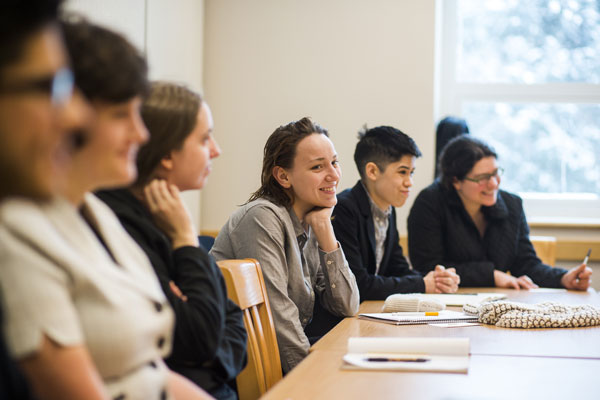
IRIS login | Reed College home Volume 96, No. 2: June 2017
Tags
"working weekend"
Combating Sexism in STEM
As snow fell outside, Reedies braved the cold to take part in “Women in STEM,” a panel discussion for students in science, technology, engineering and mathematics, on Saturday.
The session was part of Reed’s 2014 Working Weekend, an event hosted by the Center for Life Beyond Reed to help students learn about career paths and strategies from Reed alumni.
Attendees might have anticipated that a major theme in the discussion would be the difficulties of being female in the male-dominated STEM world, but Janet Gunzner-Toste ’93 set the tone by saying, “I didn’t know there were gender issues in science. I just plowed ahead and enjoyed it.”
Continue reading Combating Sexism in STEM
Inventors Hailed at Working Weekend
Thanks to three Reedies who took top prize at the second annual StartUp Lab, biology students may soon find a new source of relief during their long hours in the lab.
Connor LaBean ’14, Anjuli Dharna ’14, and Ben Stephens ’14 were awarded $2,500 to help propel Genebot, a robotic lab assistant, from conception to reality.
Led by Bay-Area technology entrepreneur Lucas Carlson ’05, the StartUp Lab was an intensive simulation of the process of creating and selling an idea. Students worked with entrepreneurs and investors who helped them incubate ideas for start-up companies and strategize ways to bring the products to market. The Lab squeezed all the steps of an entrepreneur—inspiration, development, honing, and the pitch to an investor–into three short days, without ever leaving Vollum Hall.
The idea for Genebot came last summer after LaBean spent countless hours pipetting solutions in a Duke University lab for cloning experiments. A platform for DNA-sequence handling and cloning, Genebot would eliminate much of the manual labor from genetics research. It is capable of sharing data for open-source experiments and is projected to be marketable at a cheaper price than current alternatives. Currently, says LaBean, high-volume research is limited to biotech companies. Genebot would make such research affordable to institutions of lesser means and enable graduate students and interns to spend more of their time doing science.
Continue reading Inventors Hailed at Working Weekend


